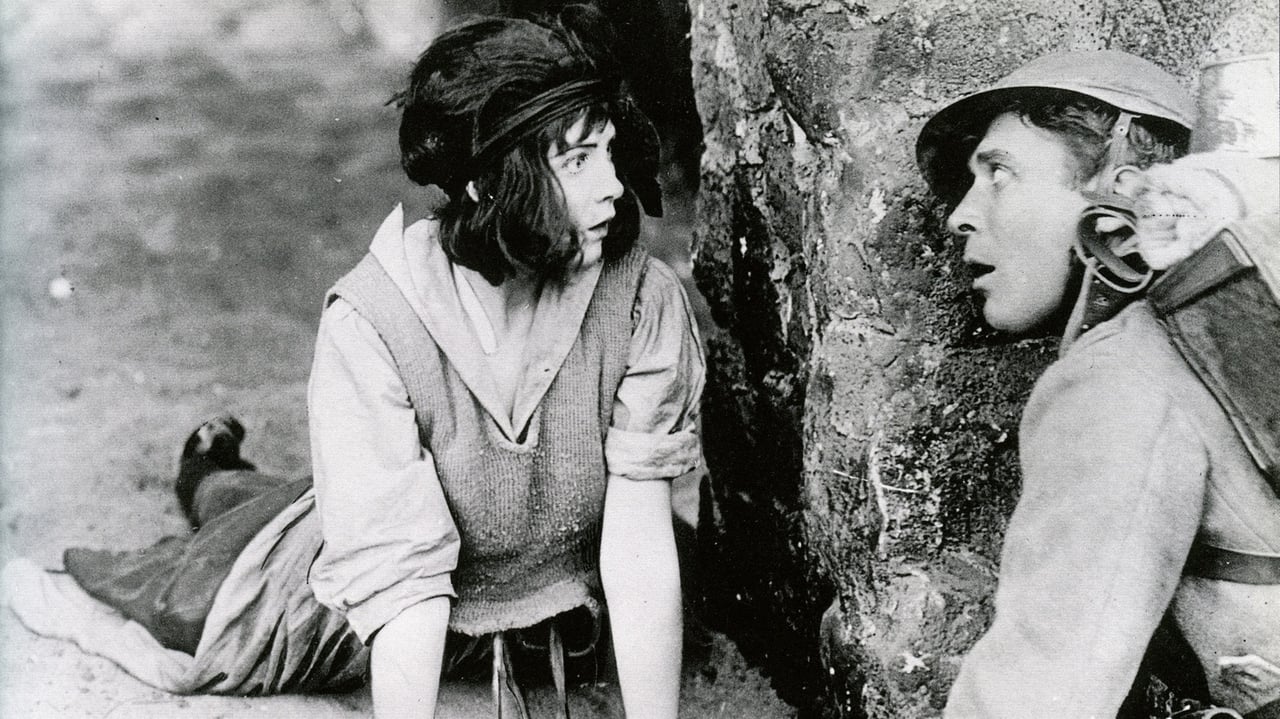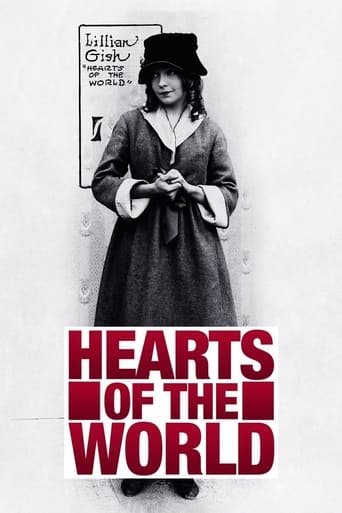Catangro
After playing with our expectations, this turns out to be a very different sort of film.
Jakoba
True to its essence, the characters remain on the same line and manage to entertain the viewer, each highlighting their own distinctive qualities or touches.
Cassandra
Story: It's very simple but honestly that is fine.
Logan
By the time the dramatic fireworks start popping off, each one feels earned.
MissSimonetta
Hearts of the World (1918) is among the least discussed of D.W. Griffith's films. There's a reason for that: it's a letdown after Intolerance (1916) and certainly not as entertaining as his more popular works. This is a propaganda picture through and through, and it has not weathered the years well.The plot is one melodramatic stock situation after another. Girl and boy promise to marry, but war intervenes. The Germans invade their village and do all sorts of Hun-ish villainy. Little kids cry over their mother's death bed. Lillian Gish is literally trapped in-between the thighs of a lascivious Prussian officer out to threaten her virginity. Americans drop in to save the day.The characters are almost all one-dimensional, but unlike Intolerance or Way Down East (1920) they are not made compelling by the actors. It's a shame, because everyone in this film was capable of better, especially the great Lillian Gish. Here she overacts to an almost embarrassing extreme, stuck between cooing at ducklings in a girlish manner or shrieking in a fit of madness.In fact, this film suffers from the same issue as Griffith's later epic, America (1924): it's too derivative of The Birth of a Nation (1915), with its bestial villains, bland central love story, and big battle scenes. Unfortunately, unlike Birth or America, Hearts' battle sequences are tension-free and uninspired.The sole redemptive feature of Hearts is Dorothy Gish as the Little Disturber. Flirty and free-spirited, she actually comes across as a human being in a world of uninspired stock characters. She also avoids being passive in her suffering and even rescues Robert and Lillian from death at the hands of the Huns during the climactic sequence.Only for those interested in Griffith or WWI propaganda; everyone else will leave disappointed.
MartinHafer
This film from D.W. Griffith chronicles the relationship between a guy and lady (called 'the boy' and 'the girl' throughout the film). Unfortunately for them, WWI begins and instead of marrying, they are separated. He goes off to war, she is stuck behind enemy lines after the Germans take over that portion of France where she lives. Will they lovers be reunited?As long as you don't take this film as a factual representation of WWI, you should watch it. However, please understand that it was a piece of blatant propaganda financed by the British government--designed to get the Americans to commit to the war. However, by the time the film was released, the Americans had declared war on the Central Powers (including Germany). Just keep in mind that the one-dimensional view of the war is historical nonsense. And, while folks in 1918 wouldn't agree, the US really had no reason to get involved in this as EVERYONE involved was responsible for this long and senseless war. But in the film, the Germans are mostly murderous guys bent on despoiling women and the French are 100% pure and virtuous--which clearly makes the film propaganda. Want some more examples? How about the intertitle card that reads "German militarists plan the dastardly blow against France and civilization"! Heck, the Germans in this one even want to blow up baby geese!! Overall, technically well made (with a few amazing battle scenes) and highly inaccurate and inflammatory.
FerdinandVonGalitzien
The relationship between this Herr Graf and Herr D. W. Griffith has been always complicated, even tumultuous through the years due to artistic considerations and differences. These disputes don't of course lessen the Amerikan director's fundamental importance in cinema history for this German count. The basic problem with Herr Griffith is that he is sometimes simplistic in his stories and often paternalistic combining religion and conservative values that make some of his work seem very dated. "Hearts Of The World" has many of those irreconcilable artistic differences for this German count. The film depicts the loves and sorrows of two American citizens in France ( Why do they have to be Americans? Surely there were lovers in France) and their families in a little town during WWI.During the first part of the film, Herr Griffith depicts the idealized and tranquil lives of the two sweethearts, their families and their neighbours, all in the typical and sentimental Herr Griffith style. There is so much sweetness in the air that this Herr Graf found himself looking forward anxiously to the arrival of Germans. Arrive they finally do, invading the village and poisoning the idyllic life with their brutality and bad manners."Hearts Of The World" it is not a pacifist film; it is true that in 1918, the date of the film's release, the world was still licking its wounds after such a big disaster but the end of the war was in sight and new perspectives were emerging making the film's lopsided and patriotic approach seem out of date. Obviously "Heart Of The World" is a fictional film not a documentary ( although the film includes real war sequences besides a prologue for the British release in which Herr Griffith himself appears in the war trenches and at 10 Downing Street; a good example of Griffith's sense of self importance ) nor does it need to be one but the story lacks interesting and realistic characters.As this Herr Graf mentioned before, the typical Herr Griffith mannerisms don't reduce his artistic accomplishments and there is much narrative vigor in this film, especially during the war sequences. It has a number of strong scenes, including one wherein our hero is paying a visit to his sweetie ( well, he's on some sort of secret mission while his comrades are being killed trying to retake the village). There is also a beautiful sequence showing our suffering heroine, temporarily deranged, and wandering in the field camp looking for her fiancée. Also outstanding are the decors and the skillful combination of fictional and real war sequences; splendid editing gives motion and emotion to those scenes.The actors do their best within the limits of Herr Griffith's particular artistic interests; Herr Douglas Gordon Hamilton does well as the handsome hero, a promising bourgeoisie writer before the war. Frau Lillian Gish and her curls, is the typical Herr Griffith heroine, conservative and candid. She will lose her innocence during wartime but emerge the stronger for it. Meanwhile Frau Lillian Gish's sister, Frau Dorothy, playing the Little Disturber overacts painfully while the German actors play their characters as America saw Germans, brutal and ruthless, utterly indifferent to the pain of others."Hearts Of The World" is a Herr Griffith film that devotees of the Amerikan film director will enjoy a lot and those who have many differences with the Griffith style, will still appreciate it to some extent if they put aside the Amerikan director's conventional and dated approach to the story and characters.And now, if you'll allow me, I must temporarily take my leave because this German Count must attend a soirée full of heartless Teutonic aristocrats.Herr Graf Ferdinand Von Galitzien http://ferdinandvongalitzien.blogspot.com
Michael_Elliott
Hearts of the World (1917) *** (out of 4) D.W. Griffith's WW1 epic has two Americans (Robert Harron, Lillian Gish) living in France and falling in love. When the German's attack the man goes off to fight, which ends with devastating results. The actual making of this film is somewhat more interesting than the final product, although the movie is still good but several notches below The Birth of a Nation and Intolerance. After that epic 1916 film Griffith wanted to try something bigger and found that the British government was willing to give him full access to anything he wanted. Griffith wanted to shoot real battle scenes and that's what he did for the film and he nearly once again was killed doing so. The British paid for the film to be made in hopes that it would inspire America to join the war effert. As for the film, it has some brilliant moments but sadly the love story really brings things down, which was somewhat surprising since Griffith is usually good with the melodrama. Harron is decent in his role but not strong enough to carry the film. Gish on the other hands is terrific as usual as is her sister Dorothy. Erich von Stroheim plays one of the German's in charge. The battle scenes, a lot of them real WW1 footage, is the highlight of the film and like Griffith's previous two films, it's rather amazing to see everything play out. This is certainly some of the greatest battlefield scenes I've ever watched. There's also another terrific scene where Gish, fearing her love is dead, tries to find him in the trenches. Gish's walk mixed with the beautiful cinematography makes this an unforgettable scene. In the end the film is certainly flawed but the battle scenes make it worth at least one viewing.

